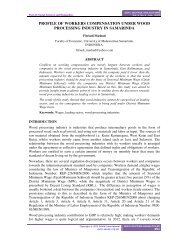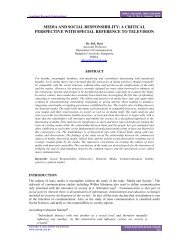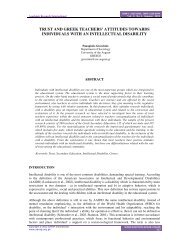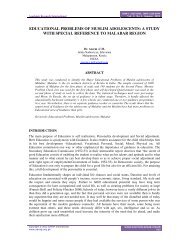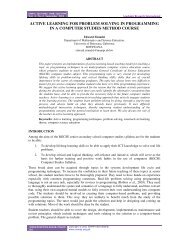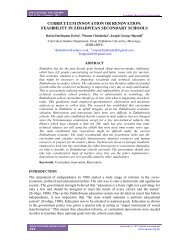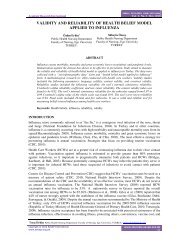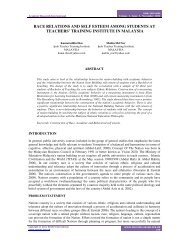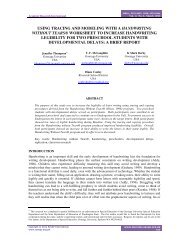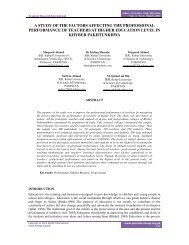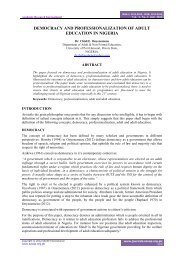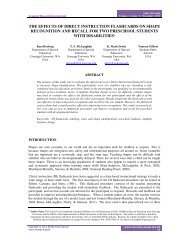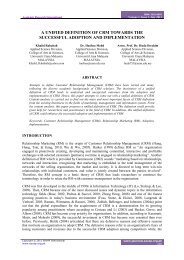how reflective practice improves teachers' classroom teaching skill?
how reflective practice improves teachers' classroom teaching skill?
how reflective practice improves teachers' classroom teaching skill?
Create successful ePaper yourself
Turn your PDF publications into a flip-book with our unique Google optimized e-Paper software.
ISSN-L: 2223-9553, ISSN: 2223-9944Vol. 4 No. 1 January 2013Academic Research Internationaleducation. Reflective teachers offer a variety of materials to students for learning andexperience (Knights, 1994).When teachers create an environment of care, love and democracy inside the <strong>classroom</strong>,students become highly motivated, which results in their better learning. This habit offriendliness usually prevails in <strong>reflective</strong> teachers (Keogh & Walker, 1994). Reflectiveteachers are aware of the intentions of their students. They plan the learning experiencesaccording to the needs and expectations of the students which help in attaining the attentionof students during <strong>teaching</strong> and learning. In an active learning environment students activelyparticipate in the process of <strong>teaching</strong> and learning which is the one of the main goals ofeducation (Heron, 1994).STATEMENT OF PROBLEMThe purpose of this study was to investigate the perceptions of Community Based Schoolteachers in district Chitral regarding the role of <strong>reflective</strong> <strong>practice</strong> in the improvement of their<strong>classroom</strong> <strong>teaching</strong> <strong>skill</strong>s. Reflective <strong>practice</strong> is defined by Schon (1996) as a process ofcritical investigation into ones’ own <strong>teaching</strong> <strong>practice</strong>s for bringing an improvement in the<strong>teaching</strong> and learning process.RESEARCH OBJECTIVEThe main research objective of this study was to investigate the perceptions of CommunityBased Schools Teachers of District Chitral regarding the role of <strong>reflective</strong> <strong>practice</strong> indevelopment of their <strong>teaching</strong> <strong>skill</strong>s.STATEMENT OF RESEARCH HYPOTHESISNew developments in the field of education have necessitated that teachers should knowvarious <strong>teaching</strong> and learning strategies for enabling students to optimize their learning. Thiswill not materialize unless teachers become critical investigators in the process of education(Hillocks, 1995). Therefore, it was hypothesized that teachers in Community based Schoolsin district Chitral were <strong>teaching</strong> <strong>reflective</strong>ly in their real <strong>classroom</strong> situation and their<strong>teaching</strong> <strong>skill</strong>s have improved after attending training on <strong>reflective</strong> <strong>practice</strong>.REVIEW OF RELATED LITERATUREReflective teachers are effective teachers. Effective teachers set priorities and examine thepurpose of <strong>classroom</strong> activities. Such teachers are aware of the purpose of curriculum anddesign interesting <strong>teaching</strong> aids for meaning learning (Hole & McEntee, 1999). In one of hisstudies Atherson (2005) argues that <strong>reflective</strong> practitioner enliven the <strong>classroom</strong> by making itchallenging, interesting and stimulating for students. Glen, Clark & Nicole (1995) identifiedsix phases of teacher’s <strong>reflective</strong> growth as part of a developmental continuum of a careerteacher such as novice, apprentice, professional, expert, distinguished, and evaluative.According to Dobbins (1997) <strong>teaching</strong> is an active process. Reflective <strong>teaching</strong> is examiningone’s own actions. Reflective teachers create possible links between the needs and specificactions of learners. Despite time constraints and the demands of the prescribed curriculum,<strong>reflective</strong> teachers focus on the diverse needs of learners. This approach enables the teachersto know the needs of learners and <strong>how</strong> to be successful in the <strong>classroom</strong> (Holly, 1991).Clarke (1995), found that <strong>reflective</strong> teachers always engage themselves in a continuous cycleof self-observation and self-evaluation in order to understand their own actions. They use<strong>teaching</strong> variety of <strong>teaching</strong> and learning strategies and the reactions they prompt inthemselves and in learners. (Boud, Keogh & Walker, 1994), explore the role of the <strong>reflective</strong>www.journals.savap.org.pk74Copyright © 2013 SAVAP Internationalwww.savap.org.pk



